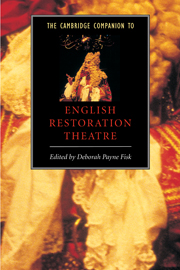Book contents
- Frontmatter
- 1 The theatre
- 2 The performance
- 3 Adaptations and revivals
- 4 Comedy
- 5 Tragedy
- 6 Tragicomedy
- 7 Farce
- 8 Restoration and settlement
- 9 Change, skepticism, and uncertainty
- 10 Drama and political crisis
- 11 Spectacle, horror, and pathos
- 12 Gender, sexuality, and marriage
- 13 Playwright versus priest
- 14 The canon and its critics
- Biographies and selected bibliography
- Index
13 - Playwright versus priest
profanity and the wit of Restoration comedy
Published online by Cambridge University Press: 28 May 2006
- Frontmatter
- 1 The theatre
- 2 The performance
- 3 Adaptations and revivals
- 4 Comedy
- 5 Tragedy
- 6 Tragicomedy
- 7 Farce
- 8 Restoration and settlement
- 9 Change, skepticism, and uncertainty
- 10 Drama and political crisis
- 11 Spectacle, horror, and pathos
- 12 Gender, sexuality, and marriage
- 13 Playwright versus priest
- 14 The canon and its critics
- Biographies and selected bibliography
- Index
Summary
A controversy which erupted in the final years of the seventeenth century threatened the survival of theatre in England. At its peak, the poet laureate, Nahum Tate, drew up “A Proposal for Regulating the Stage & Stage-Players,” describing it as “valuable only in case it is decided not to suppress the theatres entirely.” A character in George Farquhar's novel, Adventures of Covent-Garden (1698), similarly predicted that “in the Battel between the Church and the Stage” “the Theatre must down.” Such grim prophecies recalled the playhouses' mid-century fate, when a parliamentary edict in 1642 had heralded an eighteen-year ban on theatrical performances.
The attack which gave impetus to this new campaign – Jeremy Collier's A Short View of the Immorality, and Profaneness of the English Stage (1698) – was the first book-length assault on the theatre by an English author to be published since William Prynne's infamous Histriomastix (1633). Pro-stage writers quickly dubbed Collier a “Younger Histrio- Mastix” and asserted that the drama's old enemies were once again venturing into the daylight.
- Type
- Chapter
- Information
- The Cambridge Companion to English Restoration Theatre , pp. 209 - 225Publisher: Cambridge University PressPrint publication year: 2000
- 3
- Cited by



